View in other NatureServe Network Field Guides
NatureServe
Montana
Utah
Wyoming
Idaho
Wisconsin
British Columbia
South Carolina
Yukon
California
New York
Pygmy Water-lily - Nymphaea leibergii
Other Names:
Nymphaea tetragona ssp. leibergii
State Rank Reason (see State Rank above)
Known from 4 extant occurrences in western valleys and one historical collection from Salmon Lake in the Seeley Lake area. Populations are susceptible to impacts from development, recreation, siltation and aquatic weeds.
General Description
Pygmy Water-lily is an herbaceous perennial with submergent stems and floating leaves arising from a thick rhizome. The leaves have a long, slender petiole attached to the base of a long, v-shaped notch in the elliptic blades that are 7-10 cm long. The bowl-shaped flowers have long, slender stalks and float on the surface of the water. Each flower has 4 light green, narrowly elliptic sepals that are 2-3 cm long and 7-15 white, narrowly lance-shaped petals of the same length. There are 30-45 yellowish stamens, and the stigma is large and saucer-shaped. The fruit is woody and berry-like.
Phenology
Flowering in late July-August.
Species Range
Montana Range
Range Descriptions
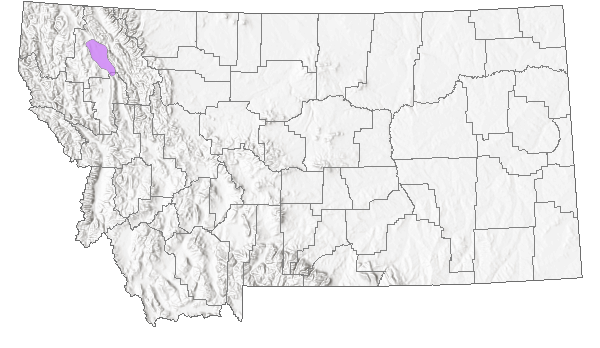
 Native
Native
Range Comments
Nymphaea leibergii occurs from northern Maine and Quebec west to British Columbia, and south to Michigan (Isle Royale), Minnesota, and Montana. Historical in Idaho. Currently reported as very common in Alaska by Heritage records. According to Wiersema (1995), however, plants in Alaska are all N. tetragona ssp. tetragona, and N. tetragona ssp. leibergii does not occur in Alaska.
Observations in Montana Natural Heritage Program Database
Number of Observations: 28
(Click on the following maps and charts to see full sized version)
Map Help and Descriptions
Relative Density
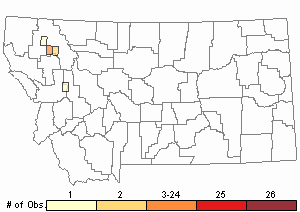
Recency
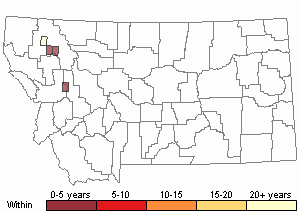
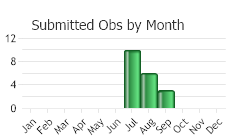
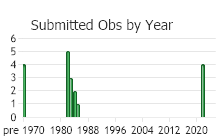
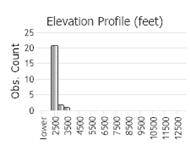 (Observations spanning multiple months or years are excluded from time charts)
(Observations spanning multiple months or years are excluded from time charts)
Habitat
Quiet, fresh water of lakes and backwater sloughs in the valleys.
National Vegetation Classification System Groups Associated with this Species
Ecology
POLLINATORS The following animal species have been reported as pollinators of this plant species or its genus where their geographic ranges overlap:
Bombus vagans (Colla and Dumesh 2010).
Stewardship Responsibility
Threats or Limiting Factors
STATE THREAT SCORE REASON
Threat impact not assigned because threats are not known (MTNHP Threat Assessment 2021).
References
- Literature Cited AboveLegend:
 View Online Publication
View Online Publication Colla, S.R. and S. Dumesh. 2010. The bumble bees of southern Ontario: notes on natural history and distribution. Journal of the Entomological Society of Ontario 141:39-68.
Colla, S.R. and S. Dumesh. 2010. The bumble bees of southern Ontario: notes on natural history and distribution. Journal of the Entomological Society of Ontario 141:39-68. MTNHP Threat Assessment. 2021. State Threat Score Assignment and Assessment of Reported Threats from 2006 to 2021 for State-listed Vascular Plants. Botany Program, Montana Natural Heritage Program, Helena, Montana.
MTNHP Threat Assessment. 2021. State Threat Score Assignment and Assessment of Reported Threats from 2006 to 2021 for State-listed Vascular Plants. Botany Program, Montana Natural Heritage Program, Helena, Montana.
- Additional ReferencesLegend:
 View Online Publication
View Online Publication
Do you know of a citation we're missing? Bursik, R. J., and R. K. Moseley. 1992. Vegetation and water chemistry monitoring and twenty-year floristic changes at Huff Lake Fen, Kaniksu National Forest. Cooperative Challenge Cost-share Project, Idaho Panhandle National Forests and Idaho Conservation Data Center, Idaho Department of Fish and Game. 27 pp.
Bursik, R. J., and R. K. Moseley. 1992. Vegetation and water chemistry monitoring and twenty-year floristic changes at Huff Lake Fen, Kaniksu National Forest. Cooperative Challenge Cost-share Project, Idaho Panhandle National Forests and Idaho Conservation Data Center, Idaho Department of Fish and Game. 27 pp. Lesica, P., M.T. Lavin, and P.F. Stickney. 2012. Manual of Montana Vascular Plants. Fort Worth, TX: BRIT Press. viii + 771 p.
Lesica, P., M.T. Lavin, and P.F. Stickney. 2012. Manual of Montana Vascular Plants. Fort Worth, TX: BRIT Press. viii + 771 p. Lesica, P., M.T. Lavin, and P.F. Stickney. 2022. Manual of Montana Vascular Plants, Second Edition. Fort Worth, TX: BRIT Press. viii + 779 p.
Lesica, P., M.T. Lavin, and P.F. Stickney. 2022. Manual of Montana Vascular Plants, Second Edition. Fort Worth, TX: BRIT Press. viii + 779 p. Porsild, A.E. 1939. Nymphaea tetragona georgi in Canada. The Canadian Field-Naturalist 53: 48-50.
Porsild, A.E. 1939. Nymphaea tetragona georgi in Canada. The Canadian Field-Naturalist 53: 48-50. Schuyler, A. E. 1983. Distributional notes on northwestern Montana aquatic vascular plants - 1982. Bartonia. 43:52-54.
Schuyler, A. E. 1983. Distributional notes on northwestern Montana aquatic vascular plants - 1982. Bartonia. 43:52-54. Wiersema, J.H. 1997. Nymphaea tetragona and Nymphaea leibergii (Nymphaceae): two species of diminuitive water-lilies in North America. Brittonia 48(4):520-531.
Wiersema, J.H. 1997. Nymphaea tetragona and Nymphaea leibergii (Nymphaceae): two species of diminuitive water-lilies in North America. Brittonia 48(4):520-531.
- Web Search Engines for Articles on "Pygmy Water-lily"





